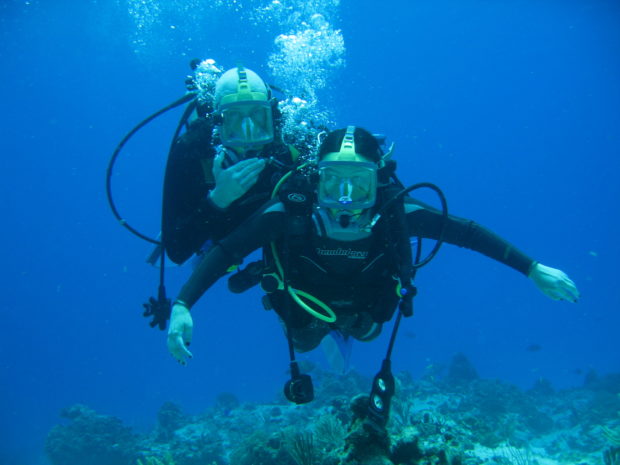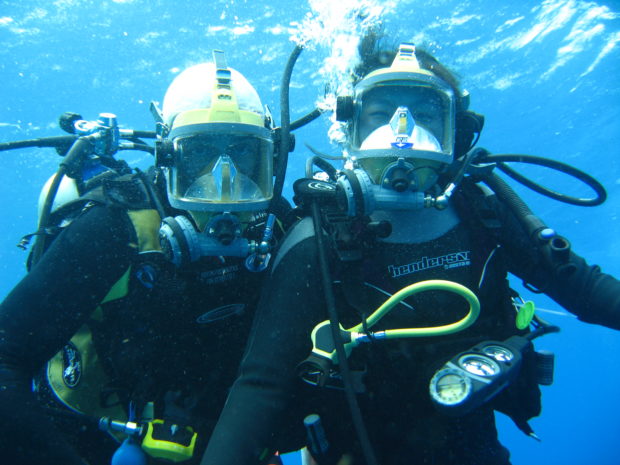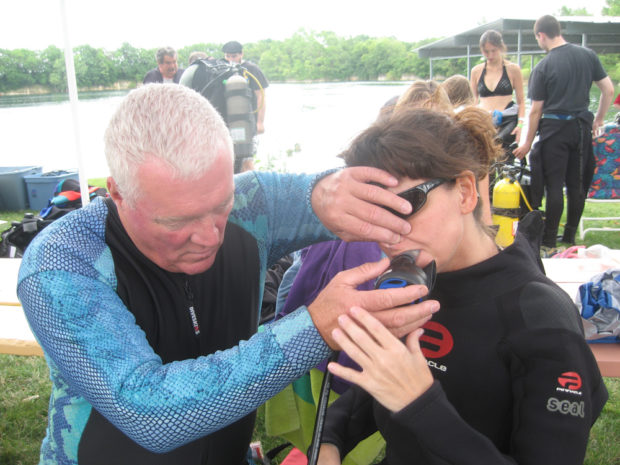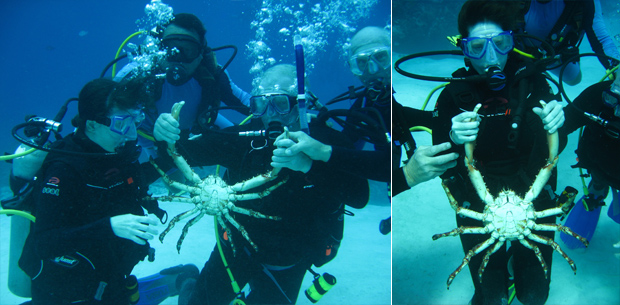Feel Good Diving
Wearing a blackout mask Diveheart founder Jim Elliott had an epiphany of the senses. In that tactile moment he understood that diving is not for eyes only.
Text by Andrew Leibs – Photographs Courtesy Diveheart

On the surface, scuba diving seems purely visual. The very phrase conjures images of razor-sharp reefs, the inviting angles of sunken wrecks, and brilliant, undulating flora and fauna. Within this spectacle, a diver’s life hangs on the ability to spy danger and read a computer or pressure gauge. What pleasure or meaning could a blind person possibly find in diving?
It’s a question that’s baffled accomplished blind people and disability advocates.
“I doubted I’d find much pleasure in it,” said George Abbott, blind since birth. “I wondered what I’d gain by giving up the two senses I rely on and treasure: my hearing and spatial orientation.” But the technical challenges, the prospect of going where most people never venture, and doing something he’d never heard of blind people doing inspired Abbott, the Vice President of Education and Training at the Hadley School for the Blind in Winnetka, Illinois.
Seeing the Light
At first, Jim Elliott didn’t see a link either. His daughter was born blind; he’d taught her and other blind people how to ski and he saw first hand the empowering effect of participation. Yet in 2001, when he launched Diveheart to make scuba diving accessible to persons with disabilities, blind participation never occurred to him. “I didn’t think there’d be anything for blind people to dive for,” said Elliott, who’s now trained over 1,500 instructors and dive buddies and launched accessible diving programs in Australia, China, and the Caribbean.
“I also thought divers needed a visual reference to control buoyancy,” Elliott told DIVER. Then one day, during adaptive training at the Haigh Quarry in Kankakee – a scuba ‘gymnasium and middle school’ for many Illinois divers – Elliott had an epiphany. Wearing a blackout mask, his body came alive. “I was feeling the quarry walls; my other senses were kicking in, and it hit me that this was really cool,” he recalls. The experience convinced him diving isn’t for eyes only.
Changing Course
Blind and visually impaired people learn scuba diving the same way as the sighted, although instruction stresses tactile orientation, and blind divers often need to reach a higher comfort level with the gear before their first dive.
The main adaptation necessary to make diving accessible and safe, according to Elliott, is communication between divers, instructors, and dive buddies; protocols that must be adhered to at all times. “You never leave a blind diver without a reference,” he said, explaining that if he has to leave one diver for another, “I first put their hands on a rock or other stationary object.”
Blind divers also need strategies for maintaining contact with their dive buddies, Hadley School VP George Abbott said. “Underwater I can’t hear where my buddy is—just the Darth Vader sucking sound of my own regulator. So I maintain contact and control my rates of descent and ascent by keeping a hand on my buddy’s tank.”
When Abbott trained with dive master Claude Jewell, then owner of the Illinois Institute of Diving in Glen Ellyn, Illinois, he developed a series of hand signals and touch techniques as a substitute for reading gauges. “To check how much air was in my tank, I’d tap my air gauge and Claude would press a closed fist – signifying 500 psi – followed by individual fingers – each representing 100 psi – into my palm to indicate the remaining air supply,” Abbott said. “To move in a new direction, we’d touch the other’s hand and gesture the new heading using the thumb.”

Seeking to further enhance the experience for blind divers required specialized equipment. Ocean Technology Systems (OTS) donated several AGA full facemasks and Ocean Reef donated communications that combine to allow instructors to talk with the blind divers they are guiding. Elliott subsequently raised funds to buy more of this equipment. For orientation, Elliott uses clock-face references with 12:00 for straight-ahead, 3:00 for a 90-degree right turn, and so on. “I’ve talked blind people through entire shipwrecks this way,” he said. Swimming backwards into a wreck he watches them as they enter, narrating the ship’s story with detail on size, cargo, circumstances of its demise – bringing its story to life – so the experience becomes more of an adventure for the blind diver.
Blind and Deaf
During a series of summer quarry dives, Elliott advanced their communications protocol so deaf-blind diver Erika Remington, a teacher at the Jacksonville, Illinois, School for the Blind, could join Diveheart on a December 2009 vacation to Cozumel. During that trip, dive master Jim Hart and Remington’s friend Rick Olsen (who lost his vision serving in Vietnam) wore communications-equipped full facemasks. Hart would talk to Olsen, who would, in turn, sign into Remington’s hand what Hart had said. The circular communication enhanced the experience for Remington and also provided a way for her reactions to be known and to communicate any problem that might arise.

Hart helped make the Cozumel dive experience as interactive as possible, putting Remington in touch – literally – with a variety of flora and fauna that included sea anemones, starfish and crabs. “We were touching everything that was safe to touch,” Elliott said, remembering one occasion when Hart “came flying up over the reef with this honking big crab, gripping its claws closed, heading for Erika.”
Elliott recalled his momentary panic but Hart briefed Olsen, who signed to Erika, who welcomed the experience. “I had two dive masters working with them and both were oceanographers,” he said. “They placed her hands below the claws. It was a great moment and I have a photo for the record.”

Sensory Perception
All of which is to say that the mantra ‘take only pictures, leave only bubbles’ doesn’t work with the blind. Seeing and touching are not the same unless you’re sight impaired, Elliott said, relating a story of two corpsmen from Great Lakes Naval Base guiding a blind vet through the Kankakee quarry. “They’d been moving through the water, exchanging tactile signals to ensure all was okay, but after a few minutes the vet surfaced and said, “Hey guys, the only way I can see is to touch. You need to get me down there so I can touch things.”
The Haigh Quarry at Kankakee, where many of Elliott’s Diveheart trainings take place, accommodates divers of differing skill levels with its graduated depths and a bottom sectioned off like an archeological site. New objects are sunk each winter. There are ship ballast stones, statuary, pillars, plates and pots – the kind of artifacts you’d expect to find in ancient ruins. There’s also mining equipment, including a stone crusher and drill left behind when the quarry was flooded. It’s a ‘feel’ good kind of place.
Of course, touch isn’t the only sense that helps underwater. Hearing is amplified. So, too, are blind divers attuned to minute pressure changes most wouldn’t notice, and they use this sensory input to advantage as they practice and perfect buoyancy skills.
For visually impaired divers, drop-offs in the weightless world of water can fuse fear with euphoria. “One moment you’re in 40 feet (12m) of water, then you go over a wall and suddenly it’s 6,000 feet (1,800m) straight down,” Elliott said. Blind diver Dan Barrett experienced that disquieting thrill on a Cayman Islands dive trip with Elliott. “Jim took me through a hole in a rock face,” Barrett remembers. “The exit was a bright spot that I could see and going through it was like free falling into a vast whiteness.”
For Barrett, a chemistry textbook editor for Houghton-Mifflin, such thrills are rare and precisely what attracted him to Diveheart. “Growing up, I had all the help I needed with reading, school, and mobility,” he said. Activities to ignite the spirit were conspicuous by their absence. “Blind diving isn’t about access or challenge, it’s about the adventure and what it does for the soul. You can develop your mind, but if you can’t satisfy the adventurous spirit, you’re incomplete.”
Barrett makes a strong case for the perceptive power of the mind’s eye. “I might not see as much under there as a sighted person, but when you’re six feet (2m) from a shark, you know it, and it’s a powerful experience!” Barrett also loves ships and history and welcomed the opportunity to explore wrecks. Navigating them, he said, is like being on underwater monkey bars, pulling yourself along to gain some familiarity.
Elliott has learned first hand that one of diving’s greatest benefits to the blind is the surging self-image that comes of doing something most people associate with technical skill and daring, and that few ever try. Citing a litany of sub sea luminaries such as Jacques Cousteau, James Bond, Lloyd Bridges of Sea Hunt and even the Navy SEALs, Elliott says, “The general public sees scuba divers as highly skilled adventurers. So when we send kids home with photos and video of their underwater achievements, it changes how they see themselves. ‘Blind Johnny’ is suddenly ‘Johnny the Scuba Diver’ and he feels more powerful and independent.”
And that’s a sight to see.
Resources
Diveheart
900 Ogden Avenue, #274
Downers Grove, IL 60515
www.diveheart.org
630.964.1983
Jim Elliott, President
jim.elliott@diveheart.org
630.408.1920
Diveheart provides therapeutic scuba diving and snorkeling education programs for disabled children, adults, and veterans.
Freedom at Depth Canada
2 Rue de L’escale
Gatineau, Quebec J8Z 3R2
www.freedomatdepth.ca
Hubert Chretien, Executive Director
hchretien@freedomatdepth.ca
Mark Dumalski, President
Handicapped Scuba Association
1104 El Prado
San Clemente, CA 92672-4637
www.hsascuba.com
949.498.4540
Jim & Pat Gatacre, Founders
hsa@hsascuba.com
HSA International provides recreational diving opportunities for people with disabilities and certification for instructors wishing to work with disabled divers.







